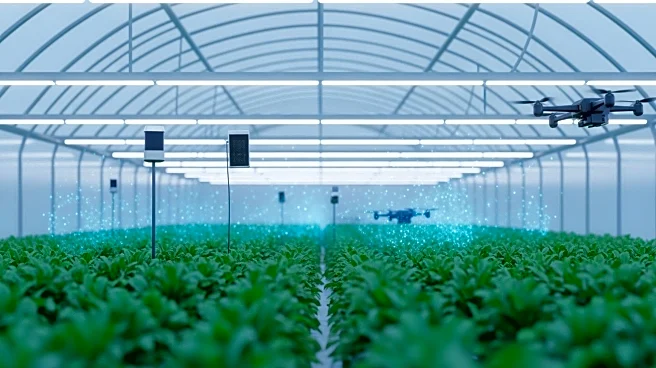What's Happening?
The digital farming market is undergoing significant growth, driven by the integration of advanced technologies such as AI, IoT, drones, and big data analytics. These innovations are enhancing productivity, sustainability, and resource efficiency in agriculture.
As global food demand increases amidst challenges like water scarcity, labor shortages, and climate change, farmers are adopting digital tools to optimize operations and yields. The U.S. Department of Agriculture and the European Union have invested heavily in promoting these technologies, addressing critical issues such as food security and environmental sustainability. The market, valued at USD 23.9 billion in 2023, is projected to grow to USD 74.7 billion by 2032, with a compound annual growth rate of 13.5%.
Why It's Important?
The expansion of the digital farming market is crucial for addressing global agricultural challenges. By adopting precision agriculture practices, farmers can increase crop yields while reducing environmental footprints. The use of IoT sensors, AI, and drones allows for real-time monitoring and automation, minimizing losses and labor dependency. This technological shift promises higher efficiency and improved sustainability, which are essential for meeting the rising food demand. The growth of this market also presents opportunities for economic development, particularly in regions like Asia-Pacific, where agricultural modernization is rapidly advancing.
What's Next?
The digital farming market faces challenges such as high initial investment costs and the need for infrastructure and technical training. However, these barriers create opportunities for tailored solutions and educational programs. Market players are innovating with scalable technologies suitable for diverse farm sizes and geographies. Collaborations between governments, tech firms, and agricultural stakeholders are expected to further stimulate market growth. As digital literacy improves and infrastructure develops, the adoption of digital farming tools is likely to accelerate, enhancing global food security and sustainability.
Beyond the Headlines
The integration of blockchain for supply chain transparency and advanced drones for crop surveillance represents a deeper shift towards data-driven agriculture. These technologies not only promise efficiency but also foster trust and traceability in food production. The ethical implications of digital farming include the potential for reducing food waste and improving resource management. Long-term, these innovations could lead to a more resilient agricultural sector capable of adapting to climate change and other global challenges.















